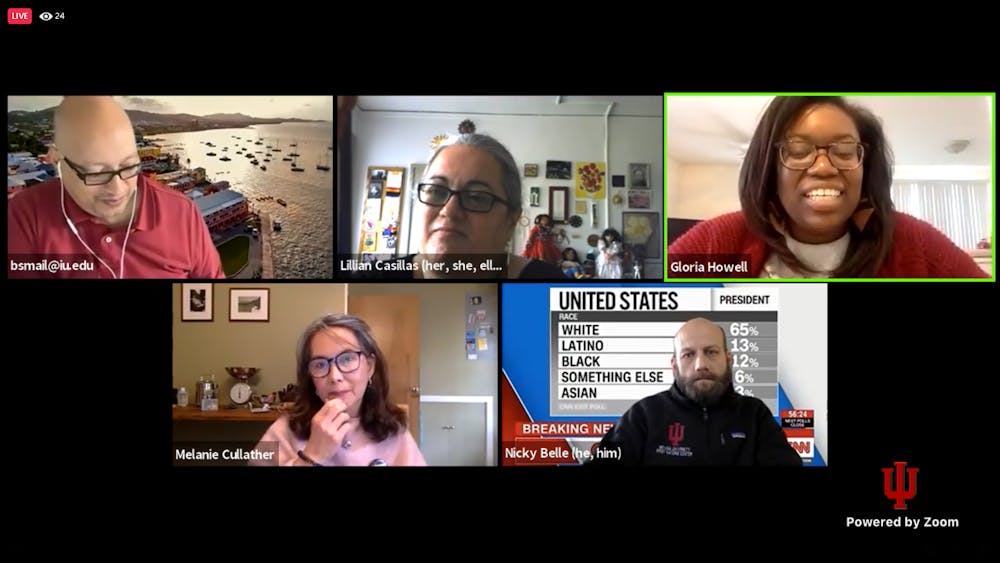The IU Culture Center directors discussed their thoughts about the 2020 election results, the affect on their communities and how they can serve their communities as the country moves forward during a Facebook live Thursday afternoon.
The number of participants fluctuated between 20 to 35.
Bruce Smail, interim director of the LGBTQ+ Culture Center, began the discussion by explaining the country is still waiting for results on the presidential election. He asked the other directors to express their feelings about the outcome so far.
Smail said he is looking forward to seeing the final result of this election and consequently what happens in the next four years.
“My hope is that the candidate that is really supportive of all the communities that I’m working with actually wins,” he said.
Melanie Castillo-Cullather, director of the Asian Culture Center, said she has felt anxious waiting for results, but has learned to be patient due to the COVID-19 pandemic.
“We need to reach the finish line, whatever that result might be,” she said.
Nicky Belle, director of the First Nations Educational & Cultural Center, said he has let himself get worked up about the numbers during this election and needed to take some time away from the news.
Belle said one of the positive outcomes of this election for him was witnessing his kids become engaged in politics, talking about the Electoral College and counting down the years until they can vote. He said it is heartening to see the commitment of people counting the votes, making sure everything runs smoothly and legally.
“That is the sort of thing that gives me hope for all of humanity,” he said.
Lillian Casillas-Origel, director of La Casa, said she is aware of the high stress level among students, faculty and staff as the country waits for election results. She said she has been keeping herself busy away from the news.
Gloria Howell, director of the Neal-Marshall Black Culture Center, said she has become less anxious as the days go by. She said she is hopeful, rather than optimistic, because she cannot ignore the reality of the possible harm to minority communities from decisions after this election.
“I don’t think you really understand how much you can bear the burdens of what happens to your students until you sit in a seat like we do,” she said.
Smail asked the directors to explain how this election will impact the country as a whole and the communities they serve. He said he thinks regardless of the outcome, people have been increasingly engaged this year in responding to issues in minority communities, such as the Black Lives Matter movement.
“I’m hoping that some of that energy continues regardless of who’s in power so that we can address the change that needs to happen,” he said.
Castillo-Cullather said she thinks this election has made it clear that the U.S. remains a divided country. She said she is glad there are strong communities and nonpartisan organizations working hard to protect votes and keep democracy intact.
“There is so much work to be done,” she said.
Belle said the U.S. is a polarized country and the native and Indigenous communities are deeply affected by the politics here. He showed an exit poll from CNN that categorized voters as white, Latino, Asian, Black and “something else.”
Belle said this poll has been receiving attention on social media and makes native and indigenous students wonder if their vote really matters.
Casillas-Origel said in her circle, she has seen people shocked at how close the race is between President Donald Trump and former Vice President Biden and has also seen a lot of people wondering why Latinos are voting for Trump. She said within the Latino community, they are a very diverse population with different realities and experiences.
“You cannot compare and say we are this cookie-cutter kind of population,” she said.
Howell said she is also frustrated about people lumping everyone in the Black community together. She said she has been encouraged by young Black activists and Black student organizations who have been fighting political battles on a local level.
Howell said she has seen a lot of people say the soul of America is on the ballot, but she wonders what the soul of America actually is.
“Is it a soul that only cares or makes space for certain people?” she said.
Smail asked the directors to discuss the ways they support their campus communities as culture center directors while responding to the results of the election. He said the LGBTQ+ Culture Center’s GroupMe, where students share their feelings and concerns, has been flooded with messages of support.
Smail said the LGBTQ+ Culture Center has virtual walk-in hours where anyone can share concerns or thoughts about the elections. He said their last Intersections series will be on Nov. 18 and will discuss how white people can use their privilege to boost the voices of people of color.
Castillo-Cullather said the Asian Culture Center will continue to be accessible for students through office hours and she wants to prioritize student suggestions for addressing issues in Asian American heritage month in April.
Belle said he wants to continue making sure students feel accepted by the FNECC not just as staff, but as people who truly care. He said the FNECC will continue to support and connect with students through programs such as their upcoming series focusing on native community wellness.
Casillas-Origel said La Casa has created spaces for students to have the opportunity to talk, although virtual spaces are not necessarily ideal for healing.
"Just know we’re not giving up and we’re here,” she said.
Howell said she is grateful for all the staff in the Neal-Marshall BlackCulture Center and has seen a lot of community support.
“We’ve really been trying to show students that there is a village behind them,” she said.



